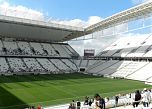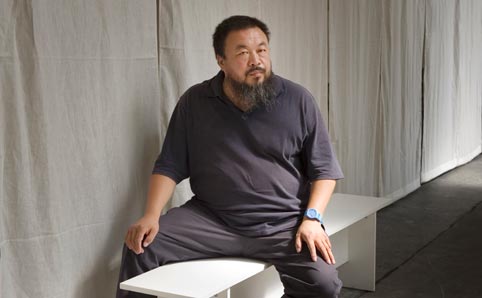
Ai Weiwei’s studio is an unassuming place. Located on the outer northeast rim of Beijing, the exterior consists of a simple blue door, a blank brick wall, and a small signage that reads ‘FAKE’. The interior is likewise: bare concrete, a courtyard of bamboo, and a dozen-or-so cats lounging about in the late winter sunshine. No one would ever suspect this peaceful haven was home to China’s most controversial activist-artist. It’s only when you turn and see the word ‘FUCK’ writ large across the e ntrance wall that the penny drops. When Ai finally appears, he asks very quietly: ‘How do you find Beijing?’ (He doesn’t avoid eye contact as many artists do.) ‘Paranoid’, we reply. Ai waves a nonchalant hand. ‘It’s the time of the big meetings,’ he says.
ntrance wall that the penny drops. When Ai finally appears, he asks very quietly: ‘How do you find Beijing?’ (He doesn’t avoid eye contact as many artists do.) ‘Paranoid’, we reply. Ai waves a nonchalant hand. ‘It’s the time of the big meetings,’ he says.
The artist is referring to The National People’s Congress, where the Chinese government was about to roll-out its 12th five-year plan at the Great Hall of The People. He seems uninterested in such affairs, but he clearly is. In the past two years, Ai’s art and life have become indistinguishable. His works are charged with potent political context.
He’s been beaten, bugged, monitored, gagged by the media, placed under house arrest and even had his Shanghai studio bulldozed to the ground. Such is his importance in China right now that any comment he makes regarding State policy (he’s an avid Twitterer, accessing the blocked site through an overseas server) is immediately picked up by the international press. A London columnist recently went so far as to say that Ai was threatening to become ‘a cultural figure of serious global importance in the mould of Vaclav Havel and Alexander Solzhenitsyn’.
Yet the overwhelming reaction to his words, and his works, is a sort of bewildering amazement at the man’s sheer bloody-minded bravery. And Ai knows it. He’s all too aware that intellectuals have been persecuted, jailed, killed or have simply vanished over the past 60 years for daring to question the all-powerful Communist Party. You only need look at his father, the poet Ai Qing, who served 26 years in political exile for daring to criticize Mao Zedong, to realise that Ai is fully prepared to accept the consequences of his very public actions. And it’s on this troubling matter that our interview, less than a month before his arrest, began.
When I told colleagues in Hong Kong and Europe that I would be interviewing you today, they were genuinely concerned for your wellbeing. So let’s begin with that: how are you?
This is becoming difficult to answer. My situation is like the studio I’m living in right now. It’s full of problems, but at the same time it’s very peaceful, yet full of crisis. For example, the car park, in that direction, has had a car watching me for over a week, day and night, two people sitting inside, even during the snowfall.
How closely are you being monitored?
Sometimes it’s one car, sometimes it’s three cars. Undercover police. This is becoming such an absurd picture. If you walk into Beijing city centre you see people are quite comfortable, nothing in crisis; but there are a lot of problems I think.
How has your personal safety been these past few days?
My safety is actually OK. I think if you are watched by the secret police you are especially OK. They will make sure nothing happens to you. But they are still trying to remind you that everything is under their control. Remember, this is the time of year where the big congressional meetings will take place, and so now that the Jasmine Revolution has been made, everybody is so nervous.
Is the ‘Jasmine Revolution’ a genuine online movement?
Yes, because China censors the entire internet and really crashes down on those who have opinions of why this society should be changed. In the past two weeks, over 100 people have been arrested. Some are long-time writers, scholars, lawyers; some are just one-time students saying ‘let’s meet on a certain corner, a certain street.’
The word ‘jasmine’ has been blocked on the internet. President’s Hu’s ‘jasmine song’ has disappeared. Foreign journalists have been kicked and punched for standing on the street. How severe has the police reaction been to what is essentially a non-demonstration?
Firstly, on the Chinese internet you cannot type any sentence with the word ‘tomorrow’ in it – the word ‘tomorrow’ has become a sensitive word.
Why?
Because maybe people will say, ‘Tomorrow we will all walk in Wang Fu Jing’ [the central spot in Beijing for the recent jasmine protest activity]. At the same time, you cannot type ‘today’. The machine will just take out anything with ‘today’ in it. [Laughs] So you can see how extremely nervous they have become. And there’s no discussion, no intellectual exchanges or argument. It’s like Chinese parents from the olden times, where the children just had to listen to them without showing any sign of disagreement, or questioning, or different attitudes. To try and challenge the economic and political situation today is not going to be OK. That is going to be devastating. This nation has had no creativity for the past 100 years.
You’re a world-famous artist, and you’re very successful, but you run the risk of going to jail at any moment. Are you afraid of jail?
I am afraid of jail, but my father was a poet [Ai Qing, 1910-1996]. I don’t admire him much as a poet, but I do admire him when in his early 20s he was sentenced to six years, and later exiled for 20 years in really the worst situation, cleaning the public toilets; and yet he survived. So if I think about my father I think, ‘this was really a strong soul, a poet, who accepted a kind of jail, a human condition.’ It’s a statement, you know? So this is how I try to make myself understand what would happen in jail. But nobody really knows what happens in the real jail.
Do you know what is happening with the writer Liu Xiaobo? What is his condition like in jail?
[Visibly angered] Even his wife cannot see him! You don’t sentence the one person, you sentence the whole family! He has totally disappeared. All the lawyers cannot see him. Nobody can see him. I mean, come on! If you are so right, if you think justice has been served then you have to do it correctly; you cannot do it secretly. This is not the time to do that. Sentence him, yes. In front of the people in open court, fine. But not secretly.
Are you angry or disappointed that the generation which followed the Tiananmen Square protests helped make China boom but also neglected its social conscious?
I think they were victimised by the system. It’s like covering up people’s eyes and ears to what the world really looks like. This is a typical product of our society. To be successful they have to maintain this order. It’s ugly and disgusting and stupid and the ‘incapable society’ has to just vanish like the water under the sunshine.
Can Tiananmen Square happen again?
You cannot imagine another demonstration like what happened in 1989. Looking back at that time, I was very disappointed because I never really had any political perspective. I had a lot of experience growing up with my father’s generation, and with living in a democratic society in New York, but only after 1999 when I got involved with architecture did I see more of the inside structure of this government. How every deal has been made. How land has been sold. How these people became rich. How they made their money. Architecture is something you build within society, and you have to deal with the government. Architecture is very political, just like the Bird’s Nest stadium.
People expect a lot from you. Can you handle it?
There is a lot of pressure but it makes you feel so much stronger because you are now related to a large number of people’s hopes and you can do something to benefit that. It’s worthwhile to say something to change the conditions of other people.
What do you want to say?
I want to say that young people should have equal opportunity, commit to a challenge, and be free to enjoy their life rather than sacrifice themselves for other people’s excuses. I want people to have a spirited life, truly independent, maybe poor, but still strong in mind. That’s not too much to ask.
Following Ai Weiwei's arrested in Beijing on 3 April 2011, he was released on bail on 22 June.
- See more on Art
- See more interviews



